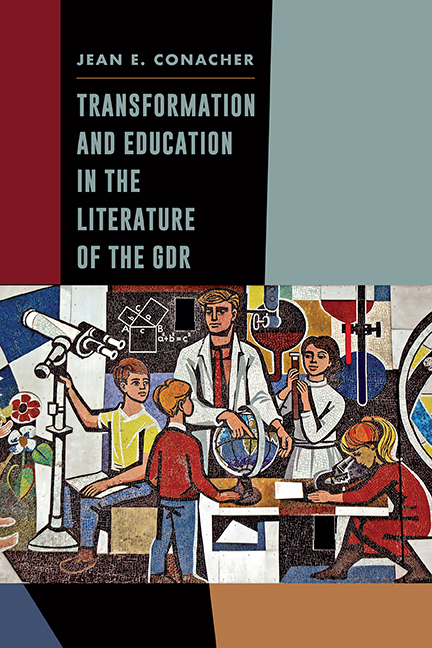Book contents
- Frontmatter
- Dedication
- Contents
- List of Illustrations
- Acknowledgments
- List of Abbreviations
- Introduction: The Postwar Desire for Renewal
- 1 Shaping the Cultural and Educational Landscape in the Soviet Occupation Zone (SBZ)
- 2 Interweaving GDR Education and Cultural Policy toward a National Literature
- 3 Critiquing the Norm in Steinmann' Die größere Liebe, Wolf' Der geteilte Himmel, and Kant' Die Aula
- 4 “Ich bin. Wer?“: Subjectivity and Transformation in Wolf' Nachdenken über Christa T. and Reimann' Franziska Linkerhand
- 5 “Wem geben wir Einsen … ?” Meritocracies and Reward in de Bruyn' Die Preisverleihung and Plenzdorf' Die neuen Leiden des jungen W.
- 6 “Mir geht es gut”: Challenging Stagnation in Hein' Der fremde Freund and H�ntsch' Wir sind keine Kinder mehr
- Conclusion
- Appendix A Text-Internal Functions of Narrative Triangle (Left Side)
- Appendix B Text-External Functions of Narrative Triangle (Right Side)
- Notes
- Bibliography
- Index
6 - “Mir geht es gut”: Challenging Stagnation in Hein' Der fremde Freund and H�ntsch' Wir sind keine Kinder mehr
Published online by Cambridge University Press: 25 March 2020
- Frontmatter
- Dedication
- Contents
- List of Illustrations
- Acknowledgments
- List of Abbreviations
- Introduction: The Postwar Desire for Renewal
- 1 Shaping the Cultural and Educational Landscape in the Soviet Occupation Zone (SBZ)
- 2 Interweaving GDR Education and Cultural Policy toward a National Literature
- 3 Critiquing the Norm in Steinmann' Die größere Liebe, Wolf' Der geteilte Himmel, and Kant' Die Aula
- 4 “Ich bin. Wer?“: Subjectivity and Transformation in Wolf' Nachdenken über Christa T. and Reimann' Franziska Linkerhand
- 5 “Wem geben wir Einsen … ?” Meritocracies and Reward in de Bruyn' Die Preisverleihung and Plenzdorf' Die neuen Leiden des jungen W.
- 6 “Mir geht es gut”: Challenging Stagnation in Hein' Der fremde Freund and H�ntsch' Wir sind keine Kinder mehr
- Conclusion
- Appendix A Text-Internal Functions of Narrative Triangle (Left Side)
- Appendix B Text-External Functions of Narrative Triangle (Right Side)
- Notes
- Bibliography
- Index
Summary
THE PERIOD FOLLOWING Wolf Biermann's Ausbürgerung was characterized by continued domestic tensions between those with power in the GDR state and individual authors. As Emmerich suggests, the solidarity among writers that had helped sustain them in the past now appeared ever more fragile, as hardline defenders of Party policy, such as Dieter Noll and Günter Görlich, took the opportunity to settle old scores. Writers began avoiding institutional events, a move that, if not one of open dissent, at least demonstrated their unwillingness to offer more than passive public support for the state's implementation of cultural policy. Some retreated from the centers of cultural activity such as Berlin in a form of inner exile. Many, in their writing, attempted “speaking within the evershifting boundaries of a permissible public voice,” as Bathrick puts it, by drawing “upon a discourse that they hoped would at once be acceptable to and yet subversive of the language of power itself.” Christa Wolf in 1980 voiced the unease of many such writers, explaining, “Wir sind problem- und konfliktüberladen gewesen, all die Jahre, haben Kopf und Hand nicht frei gehabt … nun käme es wohl darauf an, diese hinter uns liegenden Jahre nachträglich zu rehabilitieren, indem man den Lebensstoff, den sie ja in überreichlichem Maß geboten haben, literarisch angreift.” It is striking that this statement comes just as Wolf has clearly made the decision not to publish her experiences, which later, amid much furor, appeared as Was bleibt in 1990. Gisela Roethke argues that Wolf's critique of the system was not halted by this decision but was rather rerouted even more into her literary work.
This final chapter opens with a discussion of the changing face of GDR literary production in the late 1970s and the 1980s and an exploration of the global political backdrop against which cultural and educational policy and practice developed in the last decade of the GDR's existence. It considers why those born and raised in the GDR often remained on the margins of the literary establishment, leaving older generations to provide a voice for wider public dissent. In focusing upon two works—Christoph Hein's Der fremde Freund (1982) and Ursula Höntsch's Wir sind keine Kinder mehr (1990)—the chapter explores how the characters portrayed revisit the sites and memories of their younger selves in order better to understand their present concerns. This
- Type
- Chapter
- Information
- Transformation and Education in the Literature of the GDR , pp. 174 - 206Publisher: Boydell & BrewerPrint publication year: 2020



